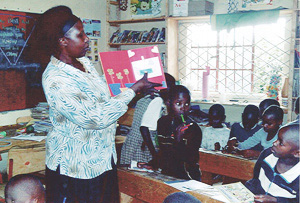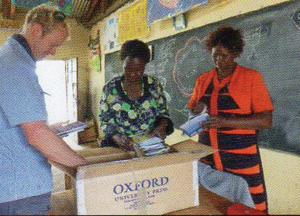 Geraldine Nanjala is a dedicated teacher and librarian at Ndege Primary School in Kenya. While she may not have a lot in resources, she’s made the most of what she has, spreading a love of literature to students.
Geraldine Nanjala is a dedicated teacher and librarian at Ndege Primary School in Kenya. While she may not have a lot in resources, she’s made the most of what she has, spreading a love of literature to students.
Her tireless efforts to bring more books and opportunities to her students have led to recognition in her home country and abroad. In 2013 she won an International Reading Association award for Literacy Projects in Countries With Developing Economies and last year she was honored at the Maktaba Awards in Kenya for her encouragement of literacy at her school.
Nanjala still faces an uphill climb in many ways, but she has grand plans for her students and community.
How did you begin your career, and what led you to your current position?
My secondary school teachers, Antony Njui who taught Swahili and Sister Fintan Wanjiku who taught English were great teachers to me. They used a storytelling approach to make lessons interesting. They also encouraged our class to be teachers by saying it’s the best career because you can work anywhere in the world and it deals with angels.
My mother was a teacher and later an area education officer. She praised the teaching career and I admired the respect she earned.
I am a currently a senior teacher and a teacher librarian. My colleagues unanimously nominated me a senior teacher in 2008 because of my dedication. I offered extra time to any work that required it. I volunteered myself any time the school needed me.
I let the pupils borrow the few story books we had in the library. I made myself responsible if they lost them and kept the list of those who borrowed what.
How long have you been a member of ILA? How has membership influenced your career?
I have been a member for 11 years, but the last four years I have been very active. My membership has really influenced my career because there is a lot I get from Reading Teacher. It has methods of teaching and how to handle special children (like those with autism), diagnostic teaching, and more. I keep referring to it.
The updates I get from these magazines have made me feel that I am a teacher of substance for those who don’t read anything and can offer solutions for pupils’ problems.
The 8th Pan African Reading for All Conference in Nairobi in 2013 allowed me to interact with other teachers of the world. I bought a CD from a teacher from South Africa which I used in my teaching. The membership has built my confidence and self-esteem for speaking in public.
As a librarian, what do you think your role is in bringing literacy to the world or, more specifically, your school? What challenges do face?
 I lead readers to where the books are because I am a custodian. I promote reading materials that are in the library and the services offered by librarians at assemblies, on notice boards, and through the class librarian. I train young librarians to assist me with services. I guide users on how to use the library, the materials, and oversee all of the resources.
I lead readers to where the books are because I am a custodian. I promote reading materials that are in the library and the services offered by librarians at assemblies, on notice boards, and through the class librarian. I train young librarians to assist me with services. I guide users on how to use the library, the materials, and oversee all of the resources.
My challenges are:
- the loss of books and slow replacement of the same;
- parents have no time to read because they are too busy;
- I have lessons, like other teachers, so I cannot arrange and cover books as required;
- very few parents let their children come on weekends and holidays because children help them to look after other children as well as look for food (child labor);
- handling my family responsibilities at the expense of the weekend library lessons;
- some teachers from other schools find my work nonsense;
- getting permission from the head teacher to attend a workshop is not easy because they say it is “your own program.”
What do you consider to be your proudest career moment?
When I was asked by our District Education Officer to tell teachers at a district workshop how I succeeded getting children interested in reading story books. She recognized my efforts to promote literacy. In September 2014, my school library was praised at a gala night in Nairobi. I had entered our library to compete in the Maktaba Awards which is a competition of libraries in the country was congratulated for voluntarily trying to make children love reading by decorating the library with attractive reading materials. This was unique among competitors in our categories (public schools). I was made to stand and they all clapped for me. I earned my school a national certificate and a gift book voucher of 5,000 Kenya shillings.
You won a 2013 IRA award for a literacy project in Kenya. Is it ongoing?
This is in the pillar of my success. In my career I have bought books and have fulfilled three-quarters of my proposal. Just the 5,000 shillings have not been spent because of the challenges I mentioned before. But I’ve planned to conduct the exercise in April when the schools are closed and have sent the first half of the expenditure. The project is going on and once I do this last part in April I’ll write a comprehensive report.
What is your plan moving forward? Do you have any upcoming long-range projects?
I would like to move forward by planning to expand the library and possibly getting computers. It could also expand into a resource center for classes with a projector for lessons. I would also like to fulfill the Maktaba Award recommendation that I go for a library management course.
I also wish to start a lunch program to keep the children in school. I see they have the desire to read, but they go with their parents to look for food on weekends and holidays. For all of this I need to find more donors to donate reading materials and to partner with for these programs.
What advice would you give a new teacher that either you received or wish you had?
- Be ready to volunteer.
- Be tolerant because you will meet people who will want to let you fail in your work.
- Be honest with yourself.
- Be loving and kind to the children and always listen to what they say.
- Attend seminars, workshops, or conferences on literacy to share and learn from others as you interact.
- Implement new ideas you have learn/acquire to benefit your learners.
- Join literacy associations to keep yourself updated on new ideas.
- Take good care of public property, especially when you’re given a grant because it comes from people who have denied themselves.
- Be alert on new information and communication technologies; visit the Web.
 April Hall is editor of Literacy Daily. A journalist for about 20 years, she has specialized in education, writing and editing for newspapers, websites, and magazines.
April Hall is editor of Literacy Daily. A journalist for about 20 years, she has specialized in education, writing and editing for newspapers, websites, and magazines.